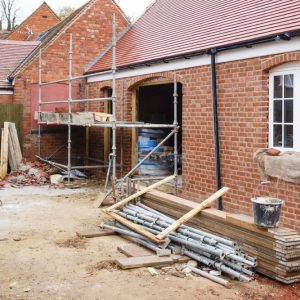
The latest figures from the S&P Global/CIPS UK Construction Purchasing Managers’ Index indicated that the UK construction sector gained momentum in October, with total industry activity rising at the fastest pace since May.
However, construction companies also noted that growth expectations for the year ahead remained very subdued. The degree of optimism has fallen sharply since September and was the lowest for almost two-and-a half years, reflecting falling volumes of new work and worries about the longer-term UK economic outlook.
A third of the survey panel anticipate a rise in business activity, while 26 per cent predict a decline. The resulting index signalled the lowest degree of optimism since May 2020.
Tim Moore, economics director at S&P Global Market Intelligence, said: “The forward-looking survey indicators highlight that growth will be harder to achieve in the coming months as rising borrowing costs, economic uncertainty and cost constraints all had a negative influence on order books in October.
“The reduction in total new work was the first since May 2020 and this fuelled increased concerns about longer-term tender opportunities.
“Construction firms cited concerns about a broad-based decline in client demand due to cutbacks on non-essential spending.”
More houses needed for first-time buyers
This reduction in new work could have a serious knock-on effect for the housing market and especially for first-time buyers. Particularly just as the Help to Buy scheme has closed.
Dorian Payne, director of Swansea-based property developers Castell Group, noted: “The underlying fact is there are just not enough houses being built and demand is still there despite rate rises.”
Joe Garner, managing director at London-based property developer NewPlace, is even more downbeat in his assessment of the situation.
He said: “The construction and development sector thrives in stable market and economic conditions from labour and materials to interest rates and house price growth. And right now, we have anything but.
“The biggest threat currently to the construction sector is rising interest rates, which impact both demand and development finance costs, and a lack of government assistance for first-time buyers, low-income families and key workers.”
Garner noted that with no like-for-like replacement for Help to Buy, SME developers would find it hard to plan for the next development cycle and that this could push them towards the rental rather than the residential market.
He said: “We need to have a decent idea of how, and with what support, first-time buyers will be able to purchase new build properties. First-time buyers account for nearly 500,000 transactions a year and without the right schemes in place, the market could see a significant reduction in these numbers.
“As finance becomes more difficult to come by and buyer numbers dwindle, it is likely an increasing number of SME developers will reallocate properties already in the development cycle towards the rental market via build to rent and private rental schemes. First-time buyers are likely to become long-term renters, not by choice but through necessity.”















